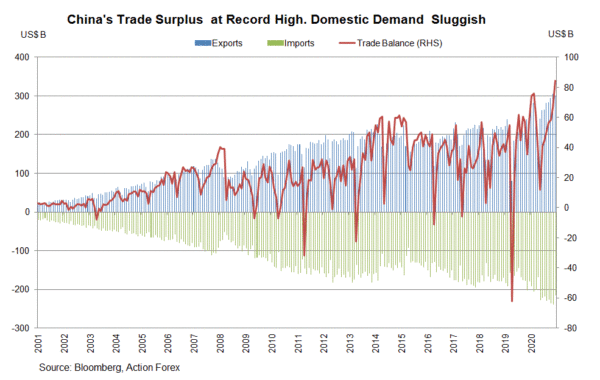China’s trade surplus soared to a record high of US$84.54B in October. Exports rose +27.1% y/y in October, down from +28.1% a month ago but exceeded consensus of +22.8%. Imports accelerated to +20.6% y/y from +17.6% in September. This, however, missed consensus of +26.2%.
Concerning exports, shipment to EU jumped to +44.3% y/y in October, from +28.6% a month ago, while that to South Korea also accelerated to +33.1% y/y in October, from +27.9$ a month ago. Exports to India improved slightly to +46.4% y/y, compared with +46.2% in September while those to ASEAN members climbed +0.7 ppt higher to 18% y/y in October. Yet, growth of exports to the US moderated to +22.7% y/y in October, from +30.6% in the prior month.
The country’s power crisis resulted in strong energy imports. Crude oil imports expanded +56.3% y/y in October, up from +34.9% a month ago, while coal imports surged +292% y/y, following a +234% jumped in September. In contrast, iron ore imports fell -1.8% y/y in October, after gaining +41.1% in September. This was due to China’s “dual control policy” targeting high-emission sectors. While supply chain disruption delayed shipment of automobile and parts, the weaker than expected imports growth evidenced weaker domestic demand. This could be driven by China’s erratic policy change, including crackdown in real estate developers and tech companies, tightening restrictions in tuition and entertainment business. These affect employment and consumer confidence.
Outpacing of imports growth by exports growth resulted in China’s record high trade surplus. While the rise in net exports would boost GDP growth in 4Q21, the underlying reason reflected the fragile economic situation in China. Weaker domestic demand is doomed to challenge China’s plan of internal circulation in economy.
Concerning the outlook of international trade, 32 countries, including EU members, will scrap preferential tariff treatment to China from December. While economists anticipate limited impacts on China’s trade, this is a sign that the world has begun resisting China’s violation of trade rules. In WTO’s regular Trade Policy Review in October, the US, the EU, the UK among others, complained about China’s reluctance to conform to the international trade rules aiming at establishing a level playing field for all participants in the global exchange of goods and services. Supply chain disruption as a result of the coronavirus pandemic, which was originated in Wuhan, China, and the current power crisis in China, have evidenced the risks of over-reliance on China as world’s factory. Indeed, the US and its allies are in the process to shift the supply chain away from China. This could be detrimental to the country’s trade and economic growth in the long term.
